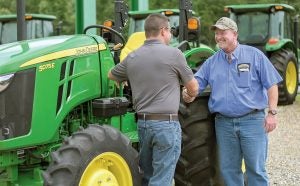A new tractor allows you to cultivate your land and crops in the most efficient way. Not to mention, when you buy new equipment, you’ll likely save money in the long run:
“The advantages of buying new equipment include income tax considerations and new technology (resulting in increased efficiency, productivity, etc.). Financing also may be easier to obtain on new equipment,” says Jim Rumsey, agricultural lecturer at the University of California, Davis
But how do you know when it’s time for a new tractor? Look out for these signs that your farm needs to upgrade its tractor.
Your farm is expanding
If the scope of your work is changing, it’s wise to consider investing in new equipment. This isn’t just a case of wanting a shiny new tractor driving through your brand-new fields. William Edwards, retired economist and former agriculture lecturer at Iowa State University, cites that “need for capacity” is one of the most important reasons to replace your farm equipment.
What does that mean? Edwards explains: “When the number of acres of crops being produced increases significantly, operators may need to replace machinery with models that have a higher capacity to complete planting and harvesting without serious timeliness losses.”
Timeliness, or ensuring that crops are planted at the right time so they’ll have the highest yield, affects your farm in many ways:
- If you plant at the wrong time because of the wrong equipment, you’ll get fewer crops.
- If you plant at the wrong time because of the wrong equipment, you’ll get a high yield of crops that don’t taste very good, and therefore won’t sell well.
You’ve started farming something new
Just as you might increase the number of crops you’re growing, you might also start growing a different crop altogether. Diversifying your farm is a great way to earn extra revenue and appeal to a new market, suggests Betsy Freese, a longtime editor in the agricultural industry — and most new crops will require new equipment.
Many new tractors have interchangeable parts that make farming different crops relatively easy. Ask your dealer for recommendations on how you can maximize your tractor’s use on the farm.

Technology has evolved
Technology affects everything, and farming is no exception. There may not be anything wrong with your tractor before it’s time to buy a new one, but Edwards notes, “In some cases, a machine may be in perfectly good working order, but the introduction of new technology has made it obsolete. Newer models may do a better job of harvesting or planting, or operate more efficiently.”
How can you stay up to date in the industry so you know when to invest in a new machine?
- Read trade magazines and websites, and not just for the articles. Advertisements of the newest tractor models will give you an idea of new models and upgrades.
- Talk to your tractor dealer regularly to find out what’s available in your area.
- Open a dialogue with other farmers in your region. What’s working for them? Are they using new technology? Check out places such as TractorForum.com, where you can connect with farmers near and wide on topics exactly like this.
Your old tractor has worked 12,000 hours
A tractor is considered worn out when it’s been used for 12,000 hours, says Rumsey. Rumsey classifies wear-out life as “the point at which it is not typically economically feasible to continue repair of the equipment.” These hours start as soon as the tractor has worked for the first time, which means that if you’ve bought a used tractor, you might have to replace it sooner than you’d think.
One of the more significant signs that your tractor is near the end of its life is engine overhaul. If you find yourself needing new pistons and injectors, it’s time for a new machine.
It’s time for a new tractor in your replacement strategy
Getting the best deal on a tractor doesn’t always mean buying a new tractor when you think you need one. Replacing equipment should be a part of your farming plan, and many farmers operate using a replacement strategy, Edwards says. Some common replacement strategies include:
- Replacing machinery often: This strategy decreases the likelihood of tractor breakdowns, and relies on trading in your machinery every few years. Most repairs will fall under the warranty, so you won’t have to worry about huge repair fees. While this strategy is efficient, it is expensive.
- Replacing machinery when you’ve got cash: This is best suited to farmers who want to save up for big equipment. However, it can be very difficult to predict when you’ll have a surplus of cash, and your tractor could break before you have the funds to replace it.
- Always repairing it: Some farmers simply choose to repair machines forever. However, using an outdated machine can result in inefficient harvesting, not to mention, finding parts for older tractors becomes more and more difficult with each passing year.
Buying a new tractor for your farm is an investment in yourself and in the future of your business. These signs will help you maintain efficiency and success by replacing your tractor when it’s time.
Will Nelson is the president of Nelson Tractor Co. with locations in Blairsville and Jasper, Georgia. Will is a past president of the Southern Equipment Dealer’s Association and has been a dedicated board member for more than 10 years. Nelson Tractor is actively involved in the local community, including participating in FFA events to support young farmers and coaching local team sports.


